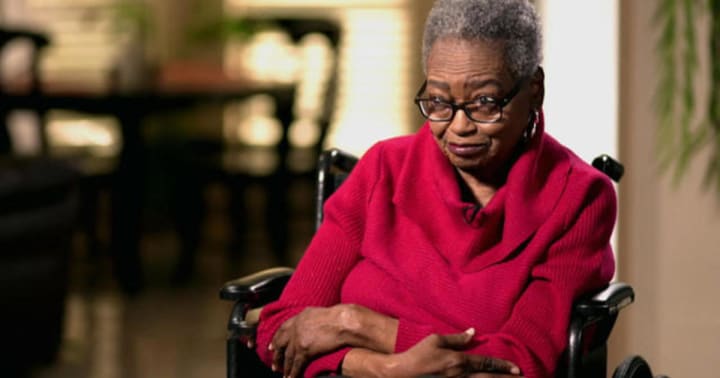Before Rosa Parks, There was Claudette Colvin
Before there was Rosa Parks was arrested for refusing to sit in the back of the bus, there was Claudette Colvin, a teen who refused to sit in the back of the bus.

Before Rosa Parks was arrested for refusing to sit in the back of the bus, there was 15-year-old Claudette Colvin brooding on the bus until and was arrested but never received attention as much as Rosa Parks.
Claudette Colvin was born on September 5, 1939, in Birmingham, Alabama to her parents Mary Jane Gadson and C. P. Austin. At a young age, Colvin's father left her and her family leaving her mother unable to financially support her and her siblings so her great-aunt took in Colvin and her siblings. Colvin grew up in the rural town of Pine Level, Alabama, about 30 miles from Montgomery. According to the Guardian, Colvin experienced racism at six while she was waiting in line at a store when a group of white boys who were laughing at her
"One little white boy approached me and said: ‘Let me see your hands.’ So I raised my hands up, and then he approached me, and he touched my hands.” Almost immediately, her mother gave her a backhand slap across the mouth – her hands re-enact the swing, and she can still recall how much it hurt. “I was crying, but that’s when I realised we weren’t supposed to touch each other.”
Colvin told The Guardian, Febuarary 25, 2021
At age eight, she and her family moved to Montgomery. Colvin attended Booker T. Washington High School. Colvin had dreams of becoming of the President of the United States.
March 2, 1955
On March 2, 1955, fifteen-year-old Colvin boarded a bus home from school. On the bus, the white section was filled up and the colored section was less. When a white woman boarded the bus and sees the "whites section" was filled, the bus driver asks the blacks sitting in their seats to move on back. Three black students sitting in Colvin’s row got up except for Colvin. The Bus Driver tells Colvin to get up but she refused. The bus driver had no choice but to contact authorities. Two police officers enter the bus and see Colvin sitting on the bus. They asked her to move but Colvin refused. Police Officers tell her to get up, but she continued on saying no and said, "It’s my constitutional right" and arrested Colvin. She was charged with violating segregation laws, misconduct, and resisting arrest. Her conviction and subsequent probation left Colvin feeling she would never get the education and professional life she so desired. She pleaded not guilty but was convicted. Two of the charges were dropped on appeal.
Nine months later, Rosa Parks's arrest sparked the movement leaving Colvin's arrest hidden.

Parks would gain more recognition and more attention by making history as the woman who refused to sit in the back, not Colvin. Until revisionist historians, a handful of journalists (notably Gary Younge), and Phillip Hoose’s National Book Award-Winning biography of Colvin corrected the record in the early 00s. In truth, the actions that Colvin took on that warm day in March planted the seed for the boycott and, critically, the legal foundations to challenge transportation segregation laws in federal court.
How come she didn’t get much attention as Rosa Parks has?
After Colvin's arrest, she found herself shunned by parts of her community. She experienced various difficulties and became pregnant. Civil rights leaders felt she was an inappropriate symbol for a test case. She was also a teenager and wasn't "fair-skinned". The leaders in the Civil Rights Movement tried to keep up appearances and make the "most appealing" protesters the most seen.
However, Rosa Parks reached out to Colvin, the two became close. Colvin would occasionally stay at Parks’ home and would serve as a mannequin for wedding dresses Parks had sewn.
“Rosa was just like her name, soft-spoken, soft-talking,” she breaks into an impression, elongating each word: “‘Claudette … I knew your mother, Mary Jane. And when I first got the news you were arrested, it hurt me so bad. They put you in a jail instead of a juvenile centre.’”
Colvin talking about Rosa, The Guardian, Febuary 25, 2021
Colvin was unfazed when Parks became the face of the bus boycott nine months later. She was pleased that adults in her community had followed in her footsteps and taken a direct stand. But retrospection leads to a different feeling now. Two months into the boycott, her attorney, Fred Gray, approached her about a civil lawsuit that would become the Browder v Gayle case. The ruling, which was taken all the way to the supreme court, found that bus segregation was unconstitutional under the 14th amendment. Colvin was one of four plaintiffs and testified in court. On June 13, 1956, the judges determined that the state and local laws requiring bus segregation in Alabama were unconstitutional. The case went to the United States Supreme Court on appeal by the state, and it upheld the district court's ruling on December 17, 1956. Three days later, the Supreme Court affirmed the order to Montgomery and the state of Alabama to end bus segregation. After the end of bus segregation, she had her son Raymond in 1956 and moved to New York City because she had a hard time finding work. She moves in with her sister and had her second son Randy in 1960. In 1969 she worked as a nurse's aide in a nursing home in Manhattan. She worked there for 35 years until she retired in 2004. During the 2000s she decided to tell her story in school and other public speaking events. In 2021, her arrest record and adjudication of delinquency has been expunged.
Now at 83 years old and retired, Colvin still continues on to tell her story at schools on how her teen self refusing to sit in the back of the bus before Rosa.

Source
Wikipedia
https://www.biography.com/activists/claudette-colvin
https://www.npr.org/2009/03/15/101719889/before-rosa-parks-there-was-claudette-colvin
https://rosaparksbiography.org/bio/claudette-colvin/
https://digitalcommons.slc.edu/womenshistory_etd/10/
https://americanswhotellthetruth.org/portraits/claudette-colvin-2/
https://www.democracynow.org/2013/3/29/the_other_rosa_parks_now_73
https://www.theguardian.com/society/2021/feb/25/claudette-colvin-the-woman-who-refused-to-give-up-her-bus-seat-nine-months-before-rosa-parks
#AD
Get 20% off sitewide, and free shipping over $50 on Moonlite Storybook. Use Coupon Code: NA. The offer ends on February 26.
About the Creator
Gladys W. Muturi
Hello, My name is Gladys W. Muturi. I am an Actress, Writer, Filmmaker, Producer, and Mother of 1.
Instagram: @gladys_muturi95
Twitter: @gladys_muturi
Facebook: facebook.com/gladystheactress
YouTube: @gladys_muturi
Reader insights
Nice work
Very well written. Keep up the good work!
Top insights
Easy to read and follow
Well-structured & engaging content
Expert insights and opinions
Arguments were carefully researched and presented
Eye opening
Niche topic & fresh perspectives
Heartfelt and relatable
The story invoked strong personal emotions
On-point and relevant
Writing reflected the title & theme






Comments (1)
I knew some of the details, but you filled in a lot of gaps (friendship with Ms. Parks; work history and later life, etc.) Thank you for this!